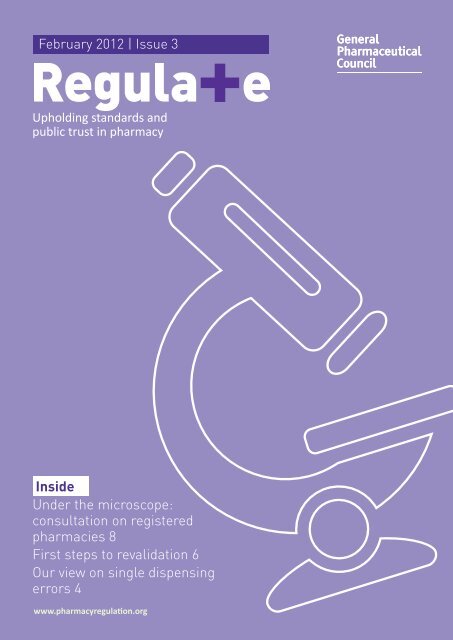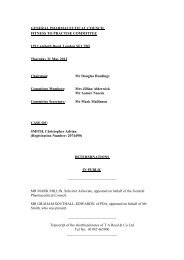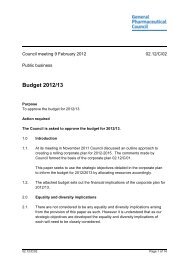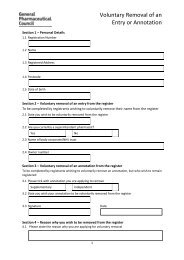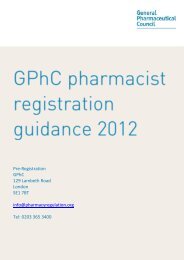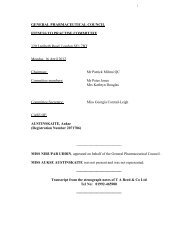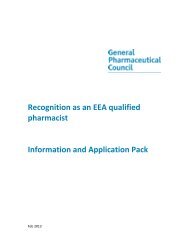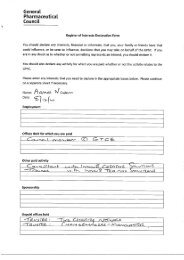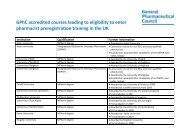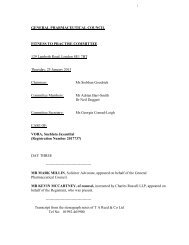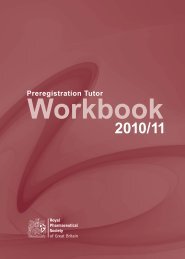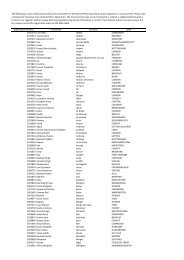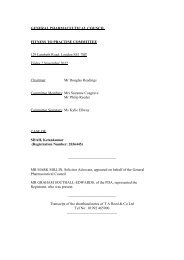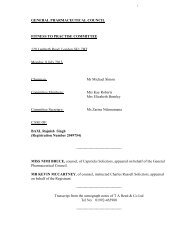Having problems seeing the embedded document below? - General ...
Having problems seeing the embedded document below? - General ...
Having problems seeing the embedded document below? - General ...
Create successful ePaper yourself
Turn your PDF publications into a flip-book with our unique Google optimized e-Paper software.
ContentsFrom <strong>the</strong> chief executiveand registrar 2Registrant update- Renewals and removals 3- Our new guidance 3- Our view on singledispensing errors 4- Can you help find <strong>the</strong>m? 4Around <strong>the</strong> UK- Meet our Director for Wales 5- Closer to Nor<strong>the</strong>rn Ireland 5First steps to revalidation 6Registered pharmaciesconsultation 8Being proportionate- Changing <strong>the</strong> order? 10Obtaining consent 12- Physical examinationsLetters 13Fitness to Practise- Determinations 14- Learning 16Regula+e is <strong>the</strong> registrant bulletin of <strong>the</strong><strong>General</strong> Pharmaceutical Council.It is sent to all registrants (at <strong>the</strong> time ofposting) and pre-registration trainees. Attimes we may approach externalorganisations or individuals to submit anarticle or opinion on a topical issue. Allarticles and letters commissioned, writtenor submitted are subject to editorial controland may not be printed in full or withreference back to source.If you would like to contact <strong>the</strong> editor orsubmit a letter or comment to Regula+eplease contact us at:regulate@pharmacyregulation.orgThe Editor, Regula+e<strong>General</strong> Pharmaceutical Council129 Lambeth Road | London | SE1 7BT<strong>General</strong> Pharmaceutical Council ©2012From <strong>the</strong> chiefexecutive andregistrar2012 is shaping up to be a busy andchallenging year and this, our thirdedition of Regula+e, seeks to give you aflavour of why that is.First, can I welcome more than 20,000pharmacy technicians to our register.<strong>Having</strong> a statutory register for pharmacytechnicians is a milestone in pharmacy.Our new registrants join around 1.2million registered health professionalsworking across <strong>the</strong> UK in 30 differen<strong>the</strong>alth professions.This edition of Regula+e has arrivedwith copies of our new guidance<strong>document</strong>s covering consent, maintainingclear sexual boundaries, and raisingconcerns. A copy of our confidentialityguidance is available on our websitewww.pharmacyregulation.org/standards/guidance and a printedcopy will be sent with <strong>the</strong> next editionof Regula+e.We have been pleased by your responseto <strong>the</strong> “taking a view” process on thiswork. Can I thank everyone who took<strong>the</strong> time to send us your comments,which we have used to shape this work.We look forward to hearing what youthink of <strong>the</strong> final products.As Regula+e lands on your doorstep,we are launching our formalconsultation on registered pharmacies.This is an important piece of work and asignificant step forward for us as <strong>the</strong>pharmacy regulator. You may know usbest as <strong>the</strong> organisation which registersyou as a pharmacist or pharmacytechnician. Now we are setting out ourvision for <strong>the</strong> regulation of pharmacies -how pharmacy services are managedand delivered in Great Britain. We havehad interim standards covering thisarea up to now.Our new approach is based on two keyideas - <strong>the</strong> outcomes we think are rightto protect patients and <strong>the</strong> public, andan approach to regulation we think isproportionate and seeks not to hinder<strong>the</strong> development of high-quality andinnovative practice. You can read moreabout our proposals on page 8. Can Iencourage you to respond in whateverway you would like. The consultationruns until 7 May.Ano<strong>the</strong>r key area of work this year isrevalidation. The GPhC Council hasrecently taken a decision to moveforward and design a model forrevalidation, which will requirepharmacists and pharmacy techniciansto demonstrate <strong>the</strong>ir fitness to practiseon an ongoing basis. We haven’t yet seta timetable for <strong>the</strong> introduction ofrevalidation. Before we do, we are keento work with you and fur<strong>the</strong>r developour ideas. We want to start by asking foryour help to refine <strong>the</strong> seven principleswe have set out to underpin this work.You can read more on page 5.I hope you continue to find Regula+teuseful and can I encourage you to shareyour thoughts with us atregulate@pharmacyregulation.orgDuncan RudkinChief executive and registrarregulate@pharmacyregulation.org2 Regula+e: February 2012 | Issue 3
Registrant updateRenewalsand removalsA total of 2.5 per cent of registrantswere removed from <strong>the</strong> register on31 December 2011 for non renewal of<strong>the</strong>ir registration. These included:• 1037 pharmacists• 158 pharmacy technicians• 34 pharmacy premisesWe have since received applicationsfor restoration from at least 152pharmacists and 10 pharmacytechnicians. We are processing allapplications for restoration as a matterof priority.Restoration costs a total of £486 forpharmacists, £297 for pharmacytechnicians and £789 for premises ifremoval has been for non renewal, whileregistration costs £267 for pharmacists,£120 for pharmacy technicians and £221for premises to renew.We list <strong>the</strong> pharmacists, pharmacytechnicians and premises that have beenremoved from <strong>the</strong> register athttp://www.pharmacyregulation.org/registration/renewing-yourregistration/removalsIt may be <strong>the</strong> case that registration hasbeen restored since we published thatinformation so it is worth searching <strong>the</strong>register for <strong>the</strong> most up-to-dateinformation.The GPhC operates what is known as arolling register, which is a requirement of<strong>the</strong> Pharmacy Order. This is <strong>the</strong>legislation which sets out our role andpowers. A rolling register means thatyour registration runs from <strong>the</strong> date youentered <strong>the</strong> register and must berenewed by that date every year.Only registrants who transferredfrom <strong>the</strong> previous regulator’s registercontinue to have a 31 Decemberexpiry date.For all registrants, <strong>the</strong> renewal deadlineis two months before your registrationexpiry date. Your renewal date is shownclearly on your renewal notice and youcan call us on 0203 365 3400 if you haveany queries.For more information about renewing your registration go tohttp://www.pharmacyregulation.org/registration/renewing-your-registrationOur newguidanceYou will have received copies of ournew pieces of guidance with thisedition of Regula+e. This workexpands on key areas of ourstandards of ethics, conduct andperformance and covers:• consent• maintaining clear sexualboundaries• raising concernsThe fourth piece of guidance coveringconfidentiality is available, with <strong>the</strong>o<strong>the</strong>r three, on our website atwww.pharmacyregulation.org/standards/guidance and a printedcopy will be sent with <strong>the</strong> nextedition of Regula+e.In <strong>the</strong> second half of last year weasked for your commentson this work. While this was not aformal consultation, we were pleasedthat many of you looked at <strong>the</strong> draftguidance on our website or on socialmedia sites, and chose to submitviews and comments.Guidance onconsentGuidance onmaintaining aining clearsexual boundariesThank you for taking <strong>the</strong> time torespond. We have taken all <strong>the</strong>feedback into account in shaping<strong>the</strong> final products, and you havealso provided us with ideas aboutfur<strong>the</strong>r guidance, which we areconsidering.February 2012February 2012February 2012Guidance onraising concernsUpholding standards and public trust in pharmacy 3
Registrant updateOur viewon singledispensingerrorsWe have consistently made clear our viewthat single dispensing errors, withouto<strong>the</strong>r significant aggravating factors,would not amount to a fitness to practiseconcern. We have <strong>the</strong>refore welcomed<strong>the</strong> recent initiative to address concernsabout <strong>the</strong> risk of prosecution when aninadvertent dispensing error is made.The Medicines and Healthcare productsRegulatory Agency (MHRA) hasannounced that it will work on aprogramme of activities to address <strong>the</strong>seconcerns. We were at <strong>the</strong> meeting heldby <strong>the</strong> MHRA, four UK HealthDepartments and Chief Pharmacists,Pharmaceutical Society of Nor<strong>the</strong>rnIreland (PSNI) and o<strong>the</strong>r interestedparties, to discuss this programme.The MHRA has indicated it intends toconduct a review of sanctions andpenalties in medicines legislation. Themeeting was also told that <strong>the</strong>Government has been considering anoption currently available to <strong>the</strong>m toamend <strong>the</strong> Health and Social Care Billwhich is being considered by Parliamentat this time. The amendment wouldenable anyone at risk of prosecutionunder section 67 of <strong>the</strong> Medicines Act tomount a defence that <strong>the</strong>y had exercisedall due diligence to avoid committingsuch an offence.GPhC Chief Executive, Duncan Rudkin said:“We welcome <strong>the</strong> commitment of <strong>the</strong>Government to legislate at <strong>the</strong> earliestopportunity and <strong>the</strong> MHRA’s plans for awider review of <strong>the</strong> nature and extent ofsanctions and penalties in this area.“As <strong>the</strong> pharmacy regulator, we want toencourage a culture of openness amongpharmacy professionals wheneveradverse incidents occur. Providingfur<strong>the</strong>r reassurance and clarification inrelation to <strong>the</strong> extent of criminal liabilityis one of <strong>the</strong> key ways that we canimprove practice and protect <strong>the</strong> public.“Anything that acts as a disincentive to<strong>the</strong> disclosure of adverse incidents,including dispensing errors, isdetrimental to public safety. This is whywe have made clear that singledispensing errors would not in our viewconstitute a fitness to practise concern,if <strong>the</strong>re was not a wider pattern of errorsor significant aggravating factors.”Can you helpfind <strong>the</strong>m?We are seeking your help to findindividuals who have put <strong>the</strong>ir careerson hold and have not yet completed<strong>the</strong>ir pre-registration training. This isparticularly <strong>the</strong> case for anyone whoentered training on or before noon on12 November 2010. They mustcomplete <strong>the</strong>ir education and trainingand apply to register by noon on20 December 2013.Our records indicate that <strong>the</strong>re is agroup of over 400 individuals in <strong>the</strong>secircumstances.Despite repeated attempts, we havenot been able to contact everyone inthis group and would appreciate yourhelp in raising awareness of <strong>the</strong> needto finish <strong>the</strong>ir training if <strong>the</strong>y intendto seek registration.The key is whe<strong>the</strong>r someone enteredpre-registration training before orafter <strong>the</strong> 2010 date.The GPhC introduced a registrationtime limit (eight years) to ensurethat <strong>the</strong> learning that traineepharmacists carry through intopractice is up to date.Anyone who entered pre-registrationtraining after <strong>the</strong> 2010 date has eightyears to complete <strong>the</strong>ir registrationas a pharmacist. This gives traineesan additional three years beyond<strong>the</strong> length of time of an MPharmdegree and year of pre-registrationtraining and <strong>the</strong> RegistrationAssessment.4 Regula+e: February 2012 | Issue 3
Around <strong>the</strong> UKNew directorfor WalesWe are delighted to welcomeDarren Hughes as our first directorfor Wales.Darren joins us from <strong>the</strong> <strong>General</strong>Medical Council (GMC), where he hasbeen acting head of office in Wales.He has worked for <strong>the</strong> GMC in Walessince 2006. Before that Darren workedfor <strong>the</strong> Countryside Alliance in a rangeof roles, including as campaignsco-ordinator in Wales.Darren said: “I’m really looking forwardto working with <strong>the</strong> GPhC to raise <strong>the</strong>profile of Welsh affairs. The healthcaredelivery structures in Wales areincreasingly diverging from those ino<strong>the</strong>r parts of <strong>the</strong> UK and I want to helpensure that <strong>the</strong> Council is regulating in away that reflects <strong>the</strong> needs of patients,<strong>the</strong> public and <strong>the</strong> pharmacyprofessions in Wales."Recent reforms in <strong>the</strong> NHS mean thatpharmacists are playing a bigger role inimproving <strong>the</strong> well-being of people inWales. I’ll also be working to helpAssembly Members, patients, educationproviders and o<strong>the</strong>r key partners tobetter understand <strong>the</strong> role andregulatory scope of <strong>the</strong> GPhC in Wales.”Darren Hughes, new director for WalesCloser to Nor<strong>the</strong>rn IrelandA consistent approach to <strong>the</strong> principles that underpin pharmacy regulationacross <strong>the</strong> United Kingdom became a reality when we signed a Memorandumof Understanding (MOU) with <strong>the</strong> Pharmaceutical Society of Nor<strong>the</strong>rn Ireland(PSNI), which has responsibility for regulating pharmacy in Nor<strong>the</strong>rn Ireland.Both <strong>the</strong> PSNI and <strong>the</strong> GPhC believe this consistency is important in maintainingpublic confidence in <strong>the</strong> pharmacy profession and in helping pharmacists topractise safely and consistently wherever <strong>the</strong>y choose within <strong>the</strong> UK.GPhC chief executive and registrar, Duncan Rudkin, said: “We are delightedto have signed this Memorandum. We already had a strong friendship withPSNI and this cements that bond. Of course this is not just a token of ourfriendship but a practical agreement and a guide to how we want tocollaborate in <strong>the</strong> future.”“This new agreement provides us with an opportunity to reassure patients and<strong>the</strong> public that both regulators are working toge<strong>the</strong>r to maintain standards on aUK-wide basis.”PSNI chief executive Trevor Patterson, said: “With increasing divergence indevolved healthcare systems <strong>the</strong>re are real challenges to regulation inmaintaining consistency whilst recognising and accommodating differences.”“This MOU is a very welcome practical example of organisations workingtoge<strong>the</strong>r in an open and practical manner to deliver <strong>the</strong>ir shared objectives.Since its inception we have enjoyed an excellent relationship with GPhC andI look forward to fur<strong>the</strong>r joint working in <strong>the</strong> future.”Upholding standards and public trust in pharmacy 5
RevalidationFirst stepsto revalidationWe have taken <strong>the</strong> decision to introducerevalidation, which will requirepharmacists and pharmacy techniciansto demonstrate <strong>the</strong>ir fitness to practiseon an ongoing basis.The GPhC Council has recently agreedboth a draft definition of revalidationand a draft set of principles.We have defined revalidation as:“The process by whichassurance of continuingfitness to practise of registrantsis provided and in a waywhich is aimed primarily atsupporting and enhancingprofessional practice.”We have also agreed seven draftprinciples (see box). Fur<strong>the</strong>r workis planned to test and refine <strong>the</strong> draftprinciples, and we would welcomeyour comments, which can be sent torevalidation@pharmacyregulation.orgGPhC Chief Executive, Duncan Rudkin, said:"This is a significant step forward inthat we have set out what we wantto achieve from this process. This isnot a souped-up version of CPD andnor are we interested in a one sizefits all approach; some abstractassessment of knowledge and skills.What we want to develop are differentapproaches depending on your areaof practice.6 Regula+e: February 2012 | Issue 3
Revalidation"A key focus for us will be to minimise<strong>the</strong> need to create new systems andprocesses as far as possible. Revalidationshould prompt pharmacy to ask itselfhow it can provide us with <strong>the</strong> evidencewe need ra<strong>the</strong>r than us taking an overlyprescriptive approach."The work to date has been developedby our Revalidation Task and FinishGroup, which has been chaired byDr Peter Wilson, and includedSarah Brown, Judy Worthington,Professor Soraya Dhillon, Gordon Dykesand Tina Funnell. All sit on <strong>the</strong> GPhCCouncil. The group developed this workhaving met with a range of stakeholdersand looked at key evidence.The group looked at <strong>the</strong> challenges facedin o<strong>the</strong>r health professions which hadsought to introduce revalidation, notingthat it had taken over 12 years for medicalrevalidation to reach <strong>the</strong> point of piloting.They heard from o<strong>the</strong>r regulatory bodieshow difficulties over defining <strong>the</strong> issue andexplaining <strong>the</strong> purpose of revalidation hadundermined attempts to introduce it.<strong>Having</strong> reviewed <strong>the</strong> evidence, <strong>the</strong>group found that <strong>the</strong> arguments for<strong>the</strong> introduction of revalidation werestill compelling:• to maintain public confidence in <strong>the</strong>pharmacy professions. Opinionpolling has repeatedly shown that <strong>the</strong>public believe health professionalsare already subject to regular reviewsor assessments of fitness to practice• evidence from <strong>the</strong> Bristol InquiryReport showed that competence didnot always grow with experience andcould diminish over time, and that<strong>the</strong>re was no system in place to spotwaning competence, to support thoseprofessionals or to protect patients• as <strong>the</strong> independent pharmacyregulator, <strong>the</strong> GPhC has a duty toassure fitness to practise ofregistrants from <strong>the</strong> point <strong>the</strong>ycome onto <strong>the</strong> register. The BristolInquiry underlined that waiting forthings to go wrong did not protectpatients adequately, and that <strong>the</strong>rewas evidence of sub-optimalperformance within <strong>the</strong> medicalprofession. Our Task and FinishGroup thought that althoughevidence of sub-optimal performancewas limited in pharmacy, <strong>the</strong> situationwas unlikely to be very different fromo<strong>the</strong>r professions• despite seeking a more flexible,tailored and flexible approach torevalidation, <strong>the</strong> government stillexpects <strong>the</strong> health professionalregulators to provide evidence on thissubject and a clear direction of travel.No timetable has yet been set for <strong>the</strong>introduction Draft principles: of revalidation. TheWe arekeen to work with you we developcontinuing assurance ofour ideas, and we expect thisfitness to practise ofdevelopment work to span at leasttwo pharmacists years. and pharmacytechnicians1. The focus should beassurance of continuingfitness to practise andnot a fixed pointassessment2. The model should beconsistent with <strong>the</strong>generic principles agreedby <strong>the</strong> Non MedicalRevalidation WorkingGroup3. The model will need toconsider more than onesource of information4. Some form ofassessment will berequired and will needto be made againsta standard5. That standard should bebased on <strong>the</strong> standardsof conduct, ethics andperformance whichapply to all registrants6. The model must takefull account of <strong>the</strong>structure of <strong>the</strong>pharmacy workforce7. Any model would needto be appropriatelycosted and subject totesting, includingpilotingUpholding standards and public trust in pharmacy 7
Registered pharmaciesOur visionfor registeredpharmaciesModernising pharmacyregulation:A consultation on <strong>the</strong> draft standards for registered pharmaciesOn 8 February, we launched aformal consultation on our visionfor a safe system of managing anddelivering pharmacy services inGreat Britain. Included in this workare new draft standards for registeredpharmacies. The consultation runsto 7 May.The way pharmacy care and servicesare organised in England, Scotland andWales is changing. Pharmacists andpharmacy technicians have knowledgeand skills which can help to promote,protect and improve <strong>the</strong> health ofindividuals and <strong>the</strong> public. Thisenhanced role - and <strong>the</strong> good that itdoes - goes way beyond dispensingmedicines on prescription.This greater scope for doing goodbrings with it <strong>the</strong> potential for newrisks. We believe it’s our role, as <strong>the</strong>pharmacy regulator, to ensure that <strong>the</strong>public is properly protected so that<strong>the</strong>y can safely benefit frompharmacy services in <strong>the</strong> way thateveryone wants.Our main concern is what matters topatients and <strong>the</strong> public so our focus inthis consultation is on what <strong>the</strong> systemfor managing and delivering pharmacyservices achieves for <strong>the</strong>m.Our consultation proposals seek to:• describe <strong>the</strong> outcomes of safe andeffective practice that we think shouldbe achieved• make clear who is responsible andwhat <strong>the</strong>y are responsible for• enable pharmacy professionals totake decisions in <strong>the</strong> best interests of<strong>the</strong>ir patients ra<strong>the</strong>r than against adetailed step by step rule book from<strong>the</strong> regulatorWe have recognised that it is not enoughfor us to publish standards for registeredpharmacies alone. We want to be clearabout which premises we believe mustbe registered with us and must adhereto our standards. We have also set out<strong>the</strong> approach we plan to take to securingcompliance with <strong>the</strong> standards and howwe will manage non-compliance.8 Regula+e: February 2012 | Issue 3
Registered pharmaciesOur consultation brings toge<strong>the</strong>r<strong>the</strong>se three key elements - registrationrequirements, draft standards, andour approach to compliance andenforcement.You can find a copy of <strong>the</strong>consultation <strong>document</strong> atwww.registeredpharmacies.orgOnce <strong>the</strong> formal period for feedbackhas finished, we will consider all <strong>the</strong>responses and produce a reportsummarising what you told us. Thisreport on feedback will be availableon our website and we will makecopies available to those whoparticipated in <strong>the</strong> consultation.In terms of next steps, <strong>the</strong>re willbe a significant period of time setaside for those who will be accountablefor upholding <strong>the</strong> standards tofamiliarise <strong>the</strong>mselves with both <strong>the</strong>final set of agreed standards, as well assubsequent guidance and policiesfrom <strong>the</strong> GPhC.We are asking a series ofquestions about our proposalsand would welcomeyour responses.The easiest way to let us know your views is to go to our dedicated websitewww.registeredpharmacies.orgYou can download copies of <strong>the</strong> consultation <strong>document</strong> and <strong>the</strong> questionnaire,or fill in our questionnaire or just <strong>the</strong> questions you are interested in, online.If you want to produce your own response, you can email that to:consultations@pharmacyregulation.orgIf you would like a hard copy of <strong>the</strong> consultation <strong>document</strong> and/orquestionnaire, you can:phone: 0203 365 3506email: consultations@pharmacyregulation.orgwrite to:Registered Pharmacies Consultationc/o Communications Department<strong>General</strong> Pharmaceutical Council129 Lambeth RoadLondon SE1 7BTO<strong>the</strong>r formatsThere is a Welsh Language version of this consultation <strong>document</strong> available atwww.registeredpharmacies.orgYou can request an alternative format by emailing us atconsultations@pharmacyregulation.org or calling us on 020 3365 3506.We will be publishing more information about <strong>the</strong> consultation on ourwebsite, here in Regula+e, and in our e-bulletin, Upda+te. You can also follow<strong>the</strong> progress of <strong>the</strong> consultation on social media sites like Twitter, LinkedInand Facebook.We will be hosting a number of meetings and events over <strong>the</strong>consultation period - you can find our calendar of events atwww.registeredpharmacies.org/eventsIf you would like us to attend a meeting or event to talk about <strong>the</strong>se proposals,please contact us at consultations@pharmacyregulation.org or call us on020 3365 3506.We will bring copies of <strong>the</strong> consultation <strong>document</strong> and questionnaire tomeetings and events.Upholding standards and public trust in pharmacy 9
Being proportionateChanging<strong>the</strong> order?We have recommended a series ofchanges to <strong>the</strong> Pharmacy Orderin advance of <strong>the</strong> Law Commission'sreview of <strong>the</strong> legislative framework forhealth professions regulation. ThePharmacy Order is <strong>the</strong> piece oflegislation which sets out <strong>the</strong> role andpowers of <strong>the</strong> GPhC.The government announced last year thatit intended to simplify <strong>the</strong> existinglegislative framework and develop a draftBill for consultation. The LawCommission's review is part of thatprocess. We have developed ourrecommendations so we are best placedto influence <strong>the</strong> design andimplementation of any new legislativeframework. Our recommendations havebeen agreed by <strong>the</strong> GPhC Council.They include:• enabling us to require evidence ofEnglish language co mpetence fromEuropean Economic Area (EEA)applicants for registration• removing <strong>the</strong> detail which specifiesregistration periods and expiry dates.We would like to have <strong>the</strong> flexibility todeal with length of registration periodsand expiry dates by way of rules,which we would consult on before<strong>the</strong>y were finalised• increasing <strong>the</strong> flexibility and efficiencyof <strong>the</strong> initial stages of <strong>the</strong> fitness topractise process by allowing greateruse of administrative decision-makingby <strong>the</strong> registrar in less serious cases,and enhancing <strong>the</strong> scope of <strong>the</strong>Council's powers to issue criteria toguide referrals to and by <strong>the</strong>investigating committee• enabling us to work in a more joinedupway with o<strong>the</strong>r regulators andauthorities, like <strong>the</strong> police, by requiringthird parties to provide informationabout people applying for registration.We have experienced difficulties insome cases in obtaining necessaryinformation• removing <strong>the</strong> requirements to specifyin rules <strong>the</strong> intervals at whichinspectors may conduct routineinspections and <strong>the</strong> circumstances forspecial inspections and o<strong>the</strong>r visits.This is so we can continue to develop arisk-based and proportionate approachto regulation.Government would be required toconsult on any changes to <strong>the</strong> PharmacyOrder.10 Regula+e: February 2012 | Issue 3
Being proportionateGPhC Chief Executive, Duncan Rudkin said:“Our approach needs to be flexible enoughto respond to <strong>the</strong> changing pharmacycontext and to allow for innovation, whilesupporting high-quality practice. We arecommitted to regulating in a proportionateand outcomes-focused way.”The Law Commission is <strong>the</strong>statutory independent bodycreated by <strong>the</strong> Law CommissionsAct 1965 to keep <strong>the</strong> law underreview and to recommendreform where it is needed.The aim of <strong>the</strong> Commission is toensure that <strong>the</strong> law is fair,modern, simple and as costeffective as possible.The Commission has beenreferred <strong>the</strong> project onRegulation of HealthcareProfessions by <strong>the</strong> Department ofHealth. The Commission aims toopen <strong>the</strong> consultation in springthis year.You can read more about <strong>the</strong>work of <strong>the</strong> Commission athttp://www.justice.gov.uk/lawcommissionUpholding standards and public trust in pharmacy 11
Obtaining consentPhysicalexaminationsA recent Fitness to Practise case hasraised <strong>the</strong> issue of pharmacistsundertaking physical examinationsOur standards of conduct, ethics andperformance emphasise thatpharmacists must recognise <strong>the</strong> limits of<strong>the</strong>ir professional competence andpractise only in those areas in which<strong>the</strong>y are competent to do so.Physical examinations of patients cansometimes be useful in making adiagnosis, but pharmacists should onlyundertake <strong>the</strong>m when <strong>the</strong>y have <strong>the</strong>appropriate skills and training for thattype of physical examination.It is also vital to gain explicit consentfrom <strong>the</strong> patient for examinations –our new guidance on consent is helpfulin understanding what you need to thinkabout when obtaining consent.Students and trainees are likely toreceive some limited training in physicalexaminations. Pharmacists may go on todevelop fur<strong>the</strong>r skills, depending on <strong>the</strong>nature of <strong>the</strong>ir practice and continuingprofessional development.We asked you aboutRegula+e...We know that you are busy people so thank you to everyone who took twominutes to take part in our online feedback survey.The results are in – 70% of you said that Regula+e is useful, quite usefulor very useful. And you made some great suggestions about how we canimprove <strong>the</strong> magazine.Over 80% of you said you would like more on learning scenarios andFtP cases. We have our regular learning section on page 16 and we will belaunching a new online learning tool soon. Keep an eye on our websitewww.pharmacyregulation.orgYou may want to tell us more, or maybe didn’t get a chance to take partin <strong>the</strong> first survey. You still can by going to www.pharmacyregulation.org/regulate-feedbackWe took your survey responses and mapped how often key words appeared.As <strong>the</strong> word cloud shows, <strong>the</strong> word you raised most often was learning.12 Regula+e: February 2012 | Issue 3
LettersDear editor,May I start this letter by saying howmuch I am enjoying having regularcommunication from <strong>the</strong> GPhC. I findreading Regula+e very interesting andcongratulate you on its production.I am a pharmacy technician in a largemultiple and have worked for <strong>the</strong>company for over 28 years. I have saton <strong>the</strong> Welsh Pharmacy Board and wasalso a member of PRLOG – a groupthat was formed to oversee <strong>the</strong>establishment of <strong>the</strong> GPhC. I am also anactive member of <strong>the</strong> Association ofPharmacy Technicians UK (APTUK),not only as its national continuingprofessional development (CPD) officer,but also <strong>the</strong> chairperson of <strong>the</strong> Cardifflocal branch.It has been a very exciting time inpharmacy over <strong>the</strong> last few yearsand I have been proud to be a memberof an evolving profession. I haveenjoyed being involved in <strong>the</strong>establishment of <strong>the</strong> GPhC and partof <strong>the</strong> sometimes very lively debateson various issues.One of <strong>the</strong> main fears of mandatoryregulation for pharmacy technicianswas how <strong>the</strong>y would cope with beinga regulated professional, and <strong>the</strong>responsibilities that came with that.I have to say that all of <strong>the</strong> pharmacytechnicians that I have spoken to,whe<strong>the</strong>r it be at a national or locallevel, have embraced regulation withopen arms and are proud to berecognised as healthcare professionals.They are enjoying <strong>the</strong> opportunityto record <strong>the</strong>ir ongoing learning asCPD entries and don’t seem to befazed by it!I look forward to receiving futureeditions of Regula+e and readingarticles relevant to pharmacytechnicians and how we as a pharmacyprofession can work efficiently toge<strong>the</strong>rensuring that we are delivering <strong>the</strong>safest services to ourpatients/customers.Fiona Price, ACT, Boots, CardiffCPD officer, APTUKDear Fiona,Thanks for letting us know your thoughtson Regula+e.We are delighted to welcome pharmacytechnicians to <strong>the</strong> register. We havetaken on board not just your feedbackbut <strong>the</strong> many calls and emails we havereceived asking for more informationabout <strong>the</strong> role of pharmacy technicians.We will be responding in an upcomingedition of Regula+e.We hope you and colleagues willcontinue to let us know how we aredoing and how regulation cancomplement your work to deliver safeservices for patients and <strong>the</strong> public.Editor.Upholding standards and public trust in pharmacy 13
Fitness to Practise - determinationsFitness toPractise –determinationsShould a fitness to practise committeedetermine that a registrant’s fitness topractise is impaired, <strong>the</strong> committee mayimpose a sanction that is proportionate to<strong>the</strong> conduct that has been found proven.This may include, for example, issuing awarning, placing conditions on <strong>the</strong>individual’s registration, suspension ofregistration or, in <strong>the</strong> most serious cases,erasing <strong>the</strong> individual from <strong>the</strong> register sothat <strong>the</strong>y can no longer practise.The matters listed here include <strong>the</strong>registrant’s registration number, date ofdetermination and <strong>the</strong> sanction.Determinations of <strong>the</strong> facts and additionalinformation about <strong>the</strong> hearings can befound on our website athttp://www.pharmacyregulation.org/search/search_decisionsLumby, Andrew, 2066939Determination date 10 NovemberWarning recorded on <strong>the</strong> register inrelation to “submitting work colleaguesto sexual harassment”; conditionimposed that he attend and completean equality and diversity educationand training course no later than16 March 2012Gaskell, Michelle Julie, 5000650Determination date 24 November 2011Warning that in her future practice, shestrictly observes <strong>the</strong> requirements ofPrinciple 6 of <strong>the</strong> Code of Ethics and <strong>the</strong>provisions of <strong>the</strong> Medicines Act 1968Adisi, Albertina, 5003399Determination date 24 November 2011Conditions imposed on registrationAtkinson, James Jamieson, 2024671Determination date 25 November 2011The registrant was erased from <strong>the</strong>registerGhafoor, Asif, 2058709Determination date 1 December 2011Warning that “when conducting any kindof examination of a patient, Mr Ghafoormust have regard to Principles 3.9 and 6.5of <strong>the</strong> Code of Ethics, which require himto take special care when dealing withvulnerable individuals, and to adhere toaccepted standards of professionalconduct. Those standards includerecognising <strong>the</strong> limits of his professionalcompetence and practising only in thoseareas in which he is competent to do so”Damji, Sameed Abdulkarim, 2069571Determination date 7 December 2011Warning that he must not put himself in aposition in <strong>the</strong> future whereby he is atrisk of contravening <strong>the</strong> provisions of <strong>the</strong>Misuse of Drugs Act 197114 Regula+e: February 2012 | Issue 3
Fitness to Practise - determinationsRosa, Rute Sofia Brito Leanardo Silva,2062636Determination date 8 December 2011Suspension for one monthAdodra, Sumir, 2048903Determination date 12 December 2011Warning that “membership of yourchosen profession as a pharmacist carrieswith it significant responsibilities in termsof both personal and professionalbehaviour. This is rightly expected, bothby <strong>the</strong> public and by your pharmaceuticalcolleagues. Your full adherence to <strong>the</strong>professional and ethical expectations of<strong>the</strong> code of conduct must be uppermostin your mind at all times. More severeconsequences will undoubtedly resultfrom any fur<strong>the</strong>r breaches of <strong>the</strong> code”Virdi, Bhupinder Singh, 2034628Determination date 13 December 2011Suspension for 12 months. Thecommittee also directed that hisregistration should be suspendedimmediately until <strong>the</strong> substantivesuspension is imposed, or pending <strong>the</strong>outcome of any appealDunkley, Robert Ian, 2018660Determination date 13 December 2011Imposition of conditions on hisemployment for two years, to bereviewed in 12 monthsSheridan, Orla Sarah, 2058723Determination date 14 December 2011Conditions placed on registration for twoyears without <strong>the</strong> need for a reviewHussain, Sajid, 2052862Determination date 15 December 2011Warning that “any repetition of <strong>the</strong> kindof behaviour that led to his conviction willplace him in jeopardy of ei<strong>the</strong>r suspensionfrom practice or removal from <strong>the</strong>register. That warning will be recorded in<strong>the</strong> register for <strong>the</strong> next five years”Hussain, Mozimmal, 2050358Determination date 19 December 2011Warning that “membership of yourchosen profession as a pharmacist carrieswith it significant responsibilities in termsof both personal and professionalbehaviour. This is rightly expected both by<strong>the</strong> public and by your pharmaceuticalcolleagues. Your full adherence to both<strong>the</strong> law as well <strong>the</strong> professional andethical expectations of <strong>the</strong> Code ofConduct must be uppermost in your mindat all times. More severe consequenceswill undoubtedly result from any fur<strong>the</strong>rcriminal code or breaches of <strong>the</strong> Code”Hutchinson, David Reginald, 2018724Determination date 20 December 2011Warning placed on <strong>the</strong> register for fiveyears “as to <strong>the</strong> complete unacceptabilityof violence of any sort in any situation”Omar, Riaz Ahamed Abdul Satar, 2036323Determination date 22 December 2011Decision to extend <strong>the</strong> suspension for aperiod of three months, and order that<strong>the</strong>re be a fur<strong>the</strong>r review before thatperiod expiresKondrasova, Juliya, 2060480Determination date 5 January 2012Suspension for 12 months, to followa previous suspension of six monthsUnadkat, Amit Vinod, 2054198Determination date 5 January 2012Conditions to remain in force for <strong>the</strong>six months remaining of <strong>the</strong>conditional orderPatel, Nirav Harshad, 2060771Determination date 18 January 2012Suspension for nine months, witha review before <strong>the</strong> end of <strong>the</strong>suspension periodTyler, Abigail Eloise Henderson, 2063688Determination date 19 January 2012Suspension for six monthsMelville, Jennifer Elizabeth, 2055865Determination date 20 January 2012Condition imposed that <strong>the</strong> registrantundertakes regular hair tests for <strong>the</strong>detection of cocaine and amphetaminesfor a two year period. The results of suchtests should be promptly forwarded to<strong>the</strong> Council and <strong>the</strong> costs of such tests areto be borne by <strong>the</strong> registrant. Thecondition will be reviewed at <strong>the</strong> end of<strong>the</strong> two yearsAlvarez-Rementaria, Maria Del RosarioFerrero, 2057434Determination date 23 JanuarySuspension for six monthsUpholding standards and public trust in pharmacy 15
Fitness to practise – learningFitness topractise –learningWe receive concernsabout pharmacyprofessionals froma wide variety ofsources. Some of <strong>the</strong>concerns fall <strong>below</strong>our threshold criteriaand so do not getreferred on to ourinvestigatingcommittee or fitnessto practise committee.Cases are onlyreferred to <strong>the</strong>secommittees where<strong>the</strong>re is reason tobelieve that <strong>the</strong>registrant’s fitness topractise may beimpaired. We are keento share learning froma variety of cases toimprove practice andfor registrants tobetter understand howwe deal with <strong>the</strong>sematters.Making false claimsfor MURsA complaint was received from asuperintendent pharmacist that apharmacist had made false statementsover a period of several months abouthis completion of Medicine Use Reviews(MURs) and that <strong>the</strong>se statements hadresulted in false claims for NHS paymentby his employer.According to <strong>the</strong> complaint, <strong>the</strong>pharmacist had reported on his keyperformance indicator that he hadcompleted 103 MURs from <strong>the</strong> period1 January 2010 to 6 April 2010 - 95 ofwhich had been claimed for from <strong>the</strong>NHS. The pharmacist later admitted tha<strong>the</strong> had completed only 15 MURs.As part of our investigation, <strong>the</strong>pharmacist was written to for anexplanation of <strong>the</strong> complaint. In hisresponse, he admitted that he knew <strong>the</strong>MUR claims were false but that he hadnot intended to defraud anyone, nor hadhe personally benefitted financially from<strong>the</strong> false claims. He had intended tocomplete <strong>the</strong> MURs later in <strong>the</strong> year buthad felt under pressure over this period.He claimed that <strong>the</strong> pharmacy had lost anumber of staff who had not beenreplaced and that he was worried tha<strong>the</strong> would lose his job.The matter was considered by <strong>the</strong>investigating committee and itconcluded that <strong>the</strong> case did not need tobe referred to <strong>the</strong> fitness to practisecommittee. The committee decided thatit was appropriate and proportionate,taking into account all of <strong>the</strong>circumstances of <strong>the</strong> case, to issue <strong>the</strong>pharmacist with a letter of warning.The committee asked that a letter bewritten to <strong>the</strong> pharmacist’s employer at<strong>the</strong> time <strong>the</strong> false claims were made,requesting <strong>the</strong>m to review <strong>the</strong>irpractices to ensure that pharmacists didnot feel under such pressure tocomplete MURs.Learning points• you must always act with honestyand integrity• you must make sure that yourprofessional judgement is notaffected by having to achievetargets set in <strong>the</strong> course of youremployment• if you feel under undue pressureto meet certain targets that havebeen set for you, you should raisethis with your manager orsuperintendent pharmacistFor a schedule of fitness to practisehearings, please visit our website,www.pharmacyregulation.org/raising-concerns/hearings/hearing-schedule16 Regula+e: February 2012 | Issue 3
Fitness to practise – learningHandling patientreturnedmedicinesA GPhC inspector received informationthat a pharmacist had dispensed a boxof five Levemir FlexPens where two of<strong>the</strong> items were date expired and one ofthose two had <strong>the</strong> plunger depressed,showing that approximately 125 units ofinsulin had been used.The patient, who had been prescribedinsulin for <strong>the</strong> first time, had noticedthat two of <strong>the</strong> pens had expired. Sheinformed her diabetes nurse when shewent for her insulin-initiationappointment. The diabetes nurseinformed <strong>the</strong> GP who prepared anincident report which was sent to <strong>the</strong>local Primary Care Trust.An inspector visited <strong>the</strong> pharmacist, whowas <strong>the</strong> responsible pharmacist at <strong>the</strong>pharmacy when <strong>the</strong> medicine wasdispensed. He admitted that he wasresponsible for <strong>the</strong> assembly of <strong>the</strong>prescription, and said <strong>the</strong> final accuracycheck had been undertaken by anaccredited checking assistant.The pharmacist told <strong>the</strong> inspector tha<strong>the</strong> had employed three students toassist in <strong>the</strong> shop. None of <strong>the</strong>m hadbeen trained in dealing with patientreturnedmedication and nor had <strong>the</strong>ycompleted an accredited medicinescounter assistant course.The pharmacist explained to <strong>the</strong>inspector that he believed one of <strong>the</strong>students had accepted some patientreturnedinsulin pens which had beenplaced in a tote box from a wholesaler.When <strong>the</strong> pharmacist had asked why <strong>the</strong>insulin pens were loose in <strong>the</strong> tote box,he was told that <strong>the</strong> packaging of <strong>the</strong>insulin pens had been damaged. Heassumed <strong>the</strong> damaged box had just beenreceived from <strong>the</strong> wholesaler and <strong>the</strong>pens removed from <strong>the</strong>ir packaging, sohe put <strong>the</strong>m in <strong>the</strong> fridge. The inspectorspoke to <strong>the</strong> three students but none of<strong>the</strong>m could remember <strong>the</strong> incident.When <strong>the</strong> pharmacist went to dispense<strong>the</strong> prescription for <strong>the</strong> five LevemirFlexpens, he went to <strong>the</strong> fridge and saw<strong>the</strong> five loose pens. He put <strong>the</strong>se in adispensing box and labelled <strong>the</strong>m for <strong>the</strong>patient. He did not check <strong>the</strong> expiry dateand nei<strong>the</strong>r did <strong>the</strong> accredited checkingassistant.The inspector examined <strong>the</strong> shelves in<strong>the</strong> dispensary and <strong>the</strong> waste bins andfound no fur<strong>the</strong>r evidence of patientreturnedmedication being re-dispensed.The whole dispensary, including <strong>the</strong>fridge, had been date-checked andrecords were available to support this.The inspector gave <strong>the</strong> pharmacist arange of advice, including <strong>the</strong>importance of checking each element ofa prescription, how to undertake <strong>the</strong>final accuracy check, good practicearound managing expiry dates, and <strong>the</strong>need to pay particular attention toinfrequently purchased and oftenexpensive items of stock, e.g. LevemirFlexpens. The inspector alsorecommended that he review <strong>the</strong>pharmacy’s procedure for acceptingpatient-returned medicines. Thepharmacist was asked to amend <strong>the</strong>pharmacy’s Standard OperatingProcedures (SOPs) to reflect <strong>the</strong>serecommendations and that all staffshould re-read and re-sign <strong>the</strong> SOPS.The matter was considered by <strong>the</strong>investigating committee who concludedthat <strong>the</strong> case did not need to be referredto <strong>the</strong> fitness to practise committee.This was on <strong>the</strong> basis that <strong>the</strong>pharmacist had co-operated with <strong>the</strong>investigation, had accepted all of <strong>the</strong>Inspector’s advice, and that onsubsequent inspection no evidence ofpatient-returned medication being redispensedwas found.The committee decided to issue a letterof warning, emphasising <strong>the</strong> importanceof staff training regarding patientreturnedmedicines.Learning points• all staff should be trained andcompetent for <strong>the</strong>ir roles and allactivities that <strong>the</strong>y carry out, evenwhen <strong>the</strong>y are students orworking part-time• always remember to check that amedicine or medical device is indate before you supply it to apatient• medicines to be disposed ofmust be kept separate from allo<strong>the</strong>r stockUpholding standards and public trust in pharmacy 17
Fitness to practise – learningInappropriate useof loyalty cardsAllegations of misconduct were receivedabout a pharmacist who used her TescoClubcard to obtain points to which shewas not entitled.The pharmacist was alleged to haveaccrued points belonging to customerswho did not present a Clubcard whilepurchasing goods on 55 occasions,and used a promotional voucher togain additional points on a fur<strong>the</strong>r43 occasions.The matter was heard by <strong>the</strong> fitness topractise committee, who found <strong>the</strong>allegations proved. The pharmacist <strong>the</strong>nadmitted that her fitness to practisewas impaired.In <strong>the</strong>ir determination of facts, <strong>the</strong>committee said <strong>the</strong> pharmacist had usedher own Clubcard to obtain pointsearned on purchases made by customerswho ei<strong>the</strong>r did not have Clubcards or didnot wish to use <strong>the</strong>m. She had also useda ‘50-extra points’ voucher, which shehad acquired from an in-storepromotion, to obtain <strong>the</strong> 50-extra pointswhen she swiped her own Clubcard ono<strong>the</strong>r people’s purchases. Terms andconditions applied to <strong>the</strong> promotionstipulating that <strong>the</strong> voucher could onlybe used once. The pharmacist had usedthis voucher on 43 occasions. The totalpoints wrongly transferred to her cardwere 2518, which amounted to £25.18.The fitness to practise committeesuspended <strong>the</strong> pharmacist for onemonth. They found that <strong>the</strong> misconductinvolved dishonesty and also amountedto an abuse of trust. On each occasionshe had been <strong>the</strong> only pharmacist onduty; her conduct had been not onlyrepetitive but systematic; and <strong>the</strong>re hadbeen no explanation of <strong>the</strong> use of <strong>the</strong>voucher on 43 occasions.The committee concluded that <strong>the</strong>re hadbeen a lack of insight. The pharmacisthad adopted a stance from <strong>the</strong> start thatshe did not realise what she was doingwas wrong and had sought to blame, insome measure, her employer for failingto instruct her about what she could useher loyalty card for. The committee saidthat if <strong>the</strong> pharmacist was in doubt, sheshould have sought advice.The committee took into account that<strong>the</strong> pharmacist had “never been introuble before” and had not ultimatelybenefitted from <strong>the</strong> conduct, nor had<strong>the</strong>re been any harm to patients nor lossto her employer.The committee did not consider that<strong>the</strong>re was a measurable risk of anyrepetition or recurrence of this typeof conduct.Learning points• inappropriate use of loyaltycards, irrespective of <strong>the</strong>monetary value gained, isdishonest• you must always be honest andtrustworthy in your professionalpractice and you must takeresponsibility for your ownactionsRefusing to sellmedicationA complaint was received that apharmacist had refused to sell a memberof <strong>the</strong> public a box of Day & Night Nursecapsules and a box of Night Nursecapsules at <strong>the</strong> same time. According to<strong>the</strong> complainant, <strong>the</strong> pharmacist hadsaid that <strong>the</strong> levels of pseudoephedrinein both boxes of capsules exceeded <strong>the</strong>legal limit, which <strong>the</strong> pharmacist thoughtwas 480 milligrams. When challenged by<strong>the</strong> member of <strong>the</strong> public, <strong>the</strong>pharmacist had acknowledged that <strong>the</strong>Night Nurse capsules did not containpseudoephedrine.The pharmacist had still expressed anunwillingness to sell both boxes ofcapsules and asserted that it was herright as a pharmacist to refuse a salethat she thought was unsafe orinappropriate.The complainant also queried <strong>the</strong>information provided about <strong>the</strong> legalrestriction on <strong>the</strong> sale ofpseudoephedrine.This matter was considered by ourinvestigations and case managementteam, toge<strong>the</strong>r with <strong>the</strong> inspectionsteam, who determined that <strong>the</strong> mattersraised did not call into question <strong>the</strong>pharmacist’s fitness to practise, and nofur<strong>the</strong>r action was required. Thecomplainant was advised thatpharmacists can use <strong>the</strong>ir professionaljudgement in determining whe<strong>the</strong>ror not to sell or supply a medicineto a patient.Even though it is not unlawful to sell abox of Day and Night Nurse capsules anda box of Night Nurse capsules in onetransaction, <strong>the</strong> pharmacist can refuseto sell any medicine if <strong>the</strong>y think that itis unsafe or inappropriate to do so.18 Regula+e: February 2012 | Issue 3
Fitness to practise – learningLearning points• you must be satisfied that anymedicine you sell or supply issafe and appropriate for <strong>the</strong>patient• if you do not think it isappropriate to sell a particularmedicine to a patient ormember of <strong>the</strong> public <strong>the</strong>n youshould fully explain your reasonsto <strong>the</strong>m• make sure that your knowledgeis up to date about <strong>the</strong>medicines that you supplySelf administrationof medicinesAn allegation was received that apharmacy technician had taken twocapsules of a prescription-only medicine(POM) from <strong>the</strong> pharmacy withouthaving a prescription, and selfadministeredthat medicine.The matter was referred directly to<strong>the</strong> fitness to practise committee.The pharmacy technician admitted<strong>the</strong> allegation.The committee heard that <strong>the</strong> pharmacytechnician took two Mucodyne capsuleswithout consent. She had been sufferingfrom an infection which she decided totreat with a “concoction” made with <strong>the</strong>content of Mucodyne capsules andsome linctus.Mucodyne products are all POMs. Thepharmacy technician had been told by<strong>the</strong> pharmacist that she could not take<strong>the</strong> capsules from pharmacy stock andwould need a prescription. However,on two occasions during <strong>the</strong> day, shemade herself a “concoction” from <strong>the</strong>capsules taken from pharmacy stock.She did not have permission fromanyone in <strong>the</strong> pharmacy.The pharmacy technician laterobtained a prescription for Mucodynesyrup from her GP and <strong>the</strong>n told <strong>the</strong>pharmacist what she had done with<strong>the</strong> capsules.The committee found that <strong>the</strong> pharmacytechnician had been dishonest and hadbreached section 58(2)(a) of <strong>the</strong>Medicines Act 1968 by obtaining <strong>the</strong>POM which could only be suppliedagainst a legally valid prescription froman appropriate practitioner (unlesso<strong>the</strong>rwise legally allowed, for examplesupply against a patient group direction).In determining <strong>the</strong> sanction, <strong>the</strong>committee said that her conduct hadonly come to light as a result of heradmission and she had not sought,at any stage, to deny making thatadmission. She had acceptedresponsibility that what she haddone was wrong.The committee said that misconduct ofthis kind had a wide range of gravity –from taking controlled drugs“surreptitiously and habitually” at oneend of <strong>the</strong> range, to <strong>the</strong> o<strong>the</strong>r end and<strong>the</strong> sort of conduct involved here. It wasa single incident; <strong>the</strong> medicine was notaddictive nor a sensation-inducing drug;it was taken for a genuine medicalcondition; and it was medicine <strong>the</strong>pharmacy technician needed, asdemonstrated by <strong>the</strong> prescription shehad subsequently obtained.The committee determined that <strong>the</strong>pharmacy technician should be issuedwith a warning, emphasising that in herfuture practice as a pharmacytechnician, she must strictly observe <strong>the</strong>requirements of Principle 6 of <strong>the</strong>standards of conduct, ethics andperformance and <strong>the</strong> provisions of <strong>the</strong>Medicines Act 1968.Learning points• you must not abuse your positionof trust as a pharmacyprofessional and <strong>the</strong> responsibilitythat you have been given• you must not self medicate from<strong>the</strong> dispensary stock, if you needa POM for a genuine medicalcondition you should get a legallyvalid prescriptionYou can find out more about <strong>the</strong> role of <strong>the</strong> investigating committee at:http://www.pharmacyregulation.org/raising-concerns/hearings/committees/investigating-committeeAnd about <strong>the</strong> fitness to practise committee at:http://www.pharmacyregulation.org/raising-concerns/hearings/committees/fitness-practise-committee*Our threshold criteria can be found at:http://www.pharmacyregulation.org/sites/default/files/The%20threshold%20criteria.pdfUpholding standards and public trust in pharmacy 19
Check that a pharmacy professional is registered:http://www.pharmacyregulation.org/<strong>the</strong>register/index.aspxCopies of Regula+e are available to download fromour website www.pharmacyregulation.org/publicationsWe welcome feedback and comments onthis publication which can be sent toregulate@pharmacyregulation.org<strong>General</strong> Pharmaceutical Council129 Lambeth Road | London | SE1 7BTTelephone: 020 3365 3400Email: info@pharmacyregulation.orgDesigned and produced by Tangerine UK


